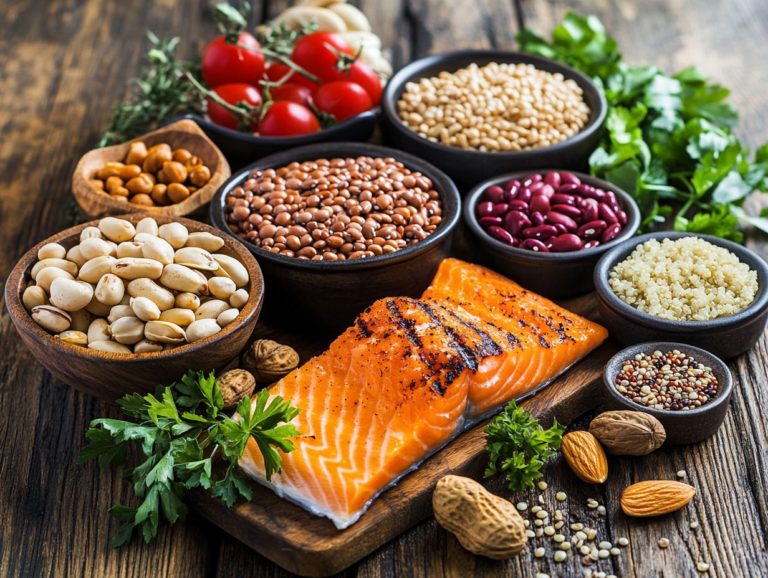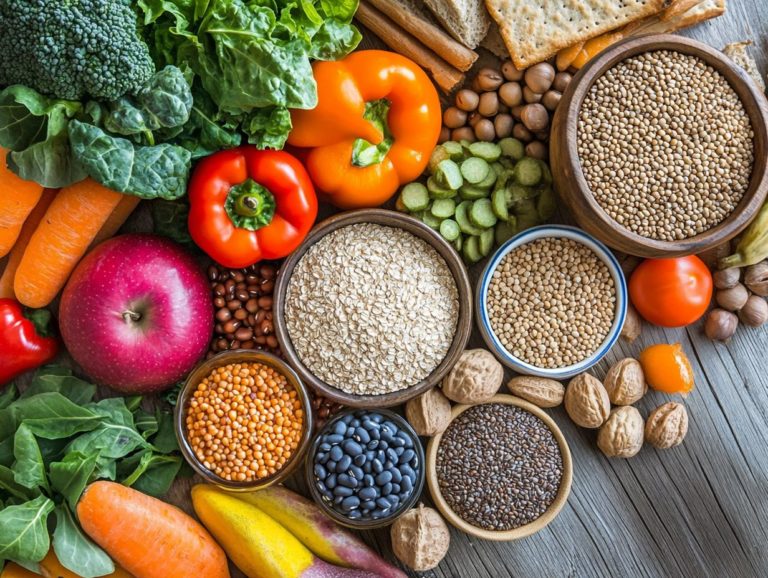Understanding Metabolism: How It Affects Nutrition
Metabolism is a vital player in how your body processes food and transforms it into energy. Several factors, such as genetics and lifestyle choices, significantly influence this complex set of processes.
This article delves into the connection between metabolism and nutrition, highlighting how various foods can affect your metabolic rate and nutrient absorption. You’ll also encounter common misconceptions about metabolism, along with effective strategies to enhance it.
By the end, you ll know exactly how to boost your metabolism and feel more energetic!
Contents
Key Takeaways:

- Metabolism is the process by which the body converts food into energy and is influenced by genetics and lifestyle factors.
- Metabolism and nutrition are closely linked, with metabolism affecting nutrient absorption and nutrition impacting metabolic rate.
- Strategies such as exercise, hydration, and balanced nutrition can help boost metabolism and promote a healthy weight.
Act now to boost your metabolism and take control of your health!
What is Metabolism?
Metabolism is the complex set of processes that change food into energy, supporting vital functions like growth, reproduction, and the maintenance of cellular structure. This system oversees energy production and dictates how efficiently you utilize nutrients, store energy, and keep your metabolism functioning smoothly through hormonal activities, enzymes, and various metabolic pathways.
When metabolism falters, it can lead to conditions such as obesity, diabetes, and metabolic syndrome, highlighting the importance of understanding this essential physiological process.
At its core, metabolism consists of two main categories: anabolic and catabolic processes. Anabolic processes build up molecules for growth, while catabolic processes break down substances to release the energy you need.
Your basal metabolic rate (BMR) is key in determining how many calories your body requires at rest. It plays a pivotal role in energy balance and weight management. A well-functioning metabolism significantly influences various aspects of your health, including energy levels, mood regulation, and the risk of chronic diseases. Therefore, it s essential to pay close attention to your metabolic health.
Factors that Influence Metabolism
Numerous factors shape your metabolism, including genetic predispositions, age-related changes, lifestyle choices, and hormonal controls. These can significantly influence your energy expenditure and caloric needs.
By understanding how these elements interact, you gain valuable insights into your unique metabolic rate and can identify potential concerns related to metabolic disorders such as obesity and diabetes.
Genetics and Lifestyle Factors
Both genetic factors and your lifestyle choices play pivotal roles in regulating your metabolism. They shape how efficiently your body burns calories and utilizes energy. Your genetic makeup can set a baseline for your metabolic rate, while elements like diet, physical activity, and exercise habits can enhance or impede this critical function.
Some genes may influence how swiftly you process fats and carbohydrates. For example, variations in genes related to insulin sensitivity and fat storage can increase your risk of conditions such as obesity, diabetes, or metabolic syndrome.
Making positive lifestyle changes like choosing a balanced, nutrient-rich diet and committing to regular exercise can significantly counteract these genetic predispositions. As you navigate your daily choices, recognizing the impact of both your inherited traits and your habits can enable you to cultivate a healthier metabolic profile and reduce the risks associated with metabolic disorders.
The Relationship Between Metabolism and Nutrition

The connection between metabolism and nutrition is crucial for your health. How you consume and use food profoundly influences your metabolic efficiency and energy needs.
Understanding how different dietary habits affect caloric intake and energy expenditure allows you to create nutrition strategies that optimize metabolic performance and help maintain healthy glucose levels.
How Metabolism Affects Nutrient Absorption
Metabolism plays an important role in how well you absorb nutrients. This directly impacts your body’s ability to use what you eat through your dietary choices. Efficient glucose metabolism and energy use depend on how well your body processes the food you ingest.
Complex processes, like the process of breaking down sugar and a cycle that helps convert food into energy, determine how your body turns carbohydrates, proteins, and fats into usable energy. When these processes go out of balance because of genetic factors, a sedentary lifestyle, or poor dietary decisions you may face health issues that affect how your body processes food, such as insulin resistance or obesity.
For instance, a diet high in processed sugars can disrupt glucose metabolism, leading to inefficient energy usage. Embracing whole foods rich in fiber, healthy fats, and lean proteins can significantly improve nutrient absorption. This promotes a balanced metabolic response and lowers the risk of developing such health issues.
Effects of Nutrition on Metabolic Rate
Nutrition plays a key role in shaping your metabolic rate. Both caloric intake and the composition of your food affect energy consumption and how effectively your body burns calories. The thermic effect of food the energy needed to digest, absorb, and process nutrients shows how your dietary choices can boost or lower your metabolic activity.
Choosing nutrient-dense foods that are rich in protein and complex carbohydrates can increase your metabolic rate since these macronutrients require more energy to metabolize than fats. Incorporating choices like green tea or spicy foods can also stimulate your metabolism due to their thermogenic properties.
It’s also important to practice portion control. Mastering caloric intake prevents your body from adapting to lower energy expenditure levels.
Adopting these dietary strategies enhances your metabolic efficiency and supports your overall well-being. It s essential for anyone looking to optimize their health and energy levels.
How to Boost Your Metabolism
Want to boost your metabolism? Try effective strategies that can quickly elevate your metabolic rate. This includes refining your exercise habits and implementing targeted nutrition strategies that meet your energy needs.
By focusing on these elements, you can significantly increase caloric burn and improve your overall metabolic health.
Effective Strategies for Increasing Metabolic Rate

You can increase your metabolic rate through effective exercise and nutrition. These approaches enhance caloric burn and optimize hormonal controls.
Engaging in intense workouts, which involve short bursts of high energy followed by rest, is a particularly potent method. These exercises compel your body to work harder, leading to an increase in calorie consumption even after you ve finished exercising.
Incorporating strength training can further elevate your metabolic rate by promoting muscle growth, which requires more energy to maintain. Adopting a balanced nutrition plan rich in protein fuels your workouts and supports recovery, playing a crucial role in metabolic function.
Hormones, like insulin and cortisol, significantly influence your metabolism. By managing stress levels and prioritizing sleep, you can enhance these hormonal responses. This holistic approach is your key to unlocking optimal metabolic health!
Common Misconceptions About Metabolism
Misconceptions about metabolism abound, creating unnecessary confusion regarding what truly defines a fast or slow metabolism and how these notions impact weight loss and overall well-being. It’s essential for you to understand these myths to steer clear of misleading information that could hinder your progress.
Debunking Myths and Misunderstandings
Debunking myths and misunderstandings about metabolism is crucial for developing a clearer perspective on how energy balance and caloric intake influence weight loss and overall metabolic health. Misconceptions can lead you to adopt ineffective strategies or foster unrealistic expectations about your metabolic capabilities.
One prevalent myth you might encounter is the belief that genetic factors solely dictate your metabolic rate. While genetics do play a role, your lifestyle choices like diet and physical activity can significantly impact your metabolism.
Another common misconception is that skipping meals will boost your metabolism. However, research suggests that maintaining regular meal patterns is key to supporting effective metabolic function.
By illuminating these inaccuracies, you can cultivate healthier habits, align your expectations with scientific realities, and ultimately enhance your metabolic efficiency for long-term wellness.
Frequently Asked Questions
What exactly is metabolism?

Metabolism refers to the chemical processes that occur within our bodies to maintain life. It affects nutrition by converting the food we eat into energy and nutrients for our body to use.
How does metabolism affect weight gain or loss?
Our metabolism plays a significant role in weight management. A slow metabolism can make it easier to gain weight, while a fast metabolism can help with weight loss. However, other factors such as diet and physical activity also play a role.
What factors can affect metabolism?
Several factors can affect metabolism, including genetics, age, gender, body composition, and hormone levels. Certain medical conditions and medications can also impact metabolism.
What is the difference between a fast and slow metabolism?
A fast metabolism refers to a high rate of energy expenditure, while a slow metabolism means a lower rate of energy expenditure. This can affect how quickly or slowly our bodies burn calories and can impact weight management.
Can a person’s metabolism be changed?
While genetics and age play a significant role in metabolism, lifestyle factors such as diet and exercise can also influence it. Making healthy lifestyle choices can help improve metabolism and overall health.
How can understanding metabolism help you make better food choices?
Understanding metabolism can help you make informed nutrition choices. By knowing how your body processes and uses energy, you can make adjustments to your diet to support your metabolism and overall health.






